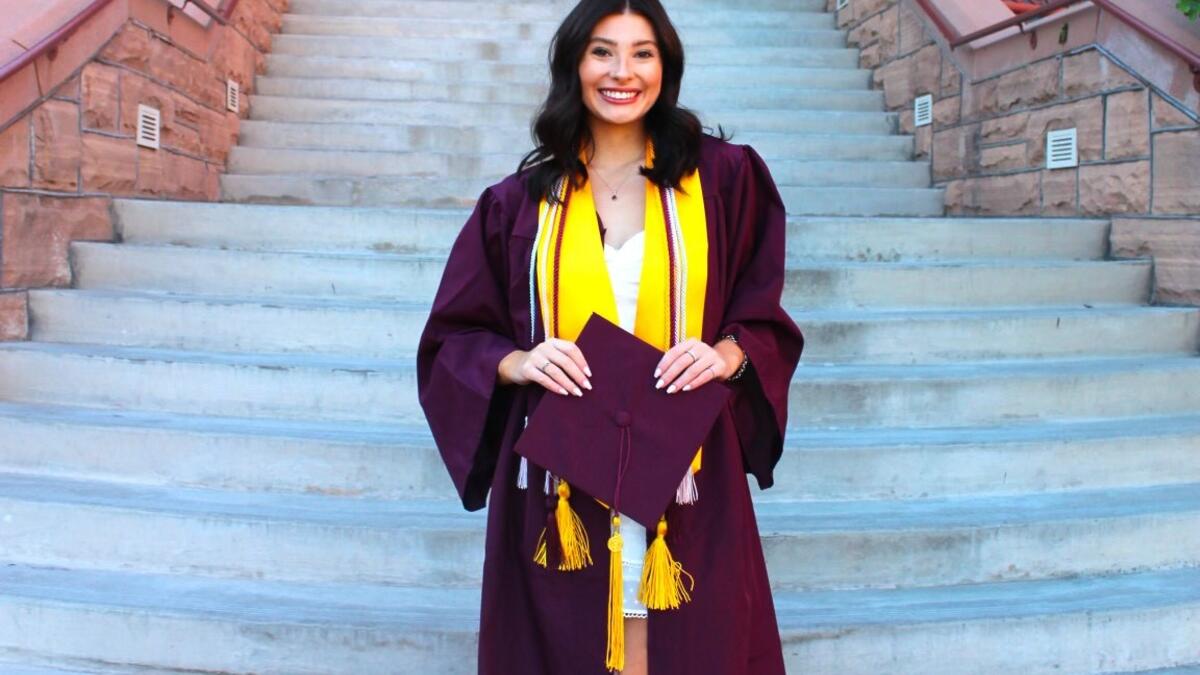Family tragedy drove ASU grad's aspirations

Alia Rocha is graduating with a Bachelor of Arts in psychology from The College of Liberal Arts and Sciences.
Editor’s note: This story is part of a series of profiles of notable fall 2022 graduates.
For Alia Rocha, who is graduating with a Bachelor of Arts in psychology from The College of Liberal Arts and Sciences at Arizona State University, a family tragedy drove her to want to become a licensed therapist.
But one of the big turning points of her time at ASU was joining the Student Alumni Association (SAA). As a freshman from Robbinsdale, Minnesota, attending ASU was a head-turning change, and she credits the SAA with providing her a sense of perspective and belonging.
Rocha, who minored in Spanish language and literature, was an SAA officer, holding the post of SAA chief of staff.
“It made me shift my perspective from being just a number to really being a student at ASU,” Rocha said.
Question: What was your “aha” moment, when you realized you wanted to study the field you majored in?
Answer: I lost my cousin to suicide the summer in between my freshman and sophomore year of high school. This was my first experience with mental health and it made me step back and realize that I want to help people overcome their mental health struggles and battles and try to be a light in someone's life.
Q: What’s something you learned while at ASU — in the classroom or otherwise — that surprised you or changed your perspective?
A: Joining SAA my freshman year changed my whole perspective on ASU. A campus of 70,000 students is intimidating to walk onto as an out-of-state freshman. SAA gave me a family on campus and made it seem so much smaller than it really is. I felt like an individual on campus rather than one of thousands of students in attendance. It helped me see campus in terms of different communities all sharing one huge passion for our university.
Q: Why did you choose ASU?
A: ASU was actually my dream school since sixth grade. I had grown up visiting my family down here in Tempe and I fell in love with the state as well as the campus. I ultimately chose ASU for a fresh start. I knew I wanted to get out of Minnesota for college and I loved the appeal of Arizona’s warm weather.
Q: Which professor taught you the most important lesson while at ASU?
A: Dr. Cavanaugh-Toft. I had her for two of my psychology classes and absolutely loved going to her lectures. I thought it was unique that she was still practicing in the clinical field while teaching. She was able to give real-life examples of a lot of the things that we were being taught. She emphasized that everyone’s minds work differently and that compassion is a very important trait to have in the field.
Q: What’s the best piece of advice you’d give to those still in school?
A: Keep on going! I had a lot of times where I felt like giving up because of my own mental health struggles and the pressures of being in college that we face today. Take a deep breath, take a step back, ask for extensions and don’t forget to keep doing the things that you love. It’s important to give yourself a break when you feel burnt out.
Q: What was your favorite spot on campus, whether for studying, meeting friends or just thinking about life?
A: My favorite study spot on campus was by the palm trees outside of the MU. I loved to just sit outside at the tables and get all of my homework done. I love people-watching and this was the best spot to do it while also being able to focus and get my work done. However, my absolute favorite spot on campus would have to be the Old Main lawn. I love being able to sit on the grass with friends and do homework or just chill out.
Q: What are your plans after graduation?
A: I plan on furthering my education by attending graduate school. I’m currently in the process of applying for a few master’s programs around the nation as well as a doctorate program here in Arizona. My overall goal is to become a licensed therapist so that I can help people who need it.
Q: If someone gave you $40 million to solve one problem on our planet, what would you tackle?
A: If someone gave me $40 million to solve one problem in the world, I would put it all towards suicide prevention. This topic hits home for me and has driven my aspirations for my career. Too many lives are lost to suicide and mental health struggles, and I’d like to find a way to bring that number down. I’ve personally experienced the hurt that suicide causes the families and friends of those who are lost, and I’d like to find a way to not only eliminate that hurt but help people find an alternative option to taking their own lives.
More Science and technology

ASU and Deca Technologies selected to lead $100M SHIELD USA project to strengthen U.S. semiconductor packaging capabilities
The National Institute of Standards and Technology — part of the U.S. Department of Commerce — announced today that it plans to…

From food crops to cancer clinics: Lessons in extermination resistance
Just as crop-devouring insects evolve to resist pesticides, cancer cells can increase their lethality by developing resistance to…

ASU professor wins NIH Director’s New Innovator Award for research linking gene function to brain structure
Life experiences alter us in many ways, including how we act and our mental and physical health. What we go through can even…